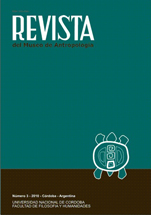The specificity of social research methodology when working with people on “probation.”The case of women “in transition”
DOI:
https://doi.org/10.31048/1852.4826.v3.n1.5452Keywords:
women, probation, methodology, relationships, heuristic sourceAbstract
This paper attempts to account the drastic change in the relationships with that happens between de anthropologist and the interlocutors in the case of women who go from being deprived of their liberty on their return to free society (“probation”). Methodological conditions that had been established during the progress of their sentence in jail can not be sustained anymore from a methodological point of view and practical and ethical issues so we must need to think what to do with the fissures that are created and likewise the mutual responsibilities appearing that radically change the scenario of an anthropological research on this subject. This paper also emphasizes the lack of references and the lack of practical investigations. We believe that this article may help to broaden the view in such situations and act as a heuristic source for similar situations.Downloads
References
Briceño-León, R (comp.) 2002 Violencia, Sociedad y Justicia en América Latina. Buenos Aires, Clacso Carlen, P Y J Tombs, 2006 Reconfigurations of penalty. The ongoing case of the women’s imprisonment and reintegration industries. Theoretical Criminology. Vol. 10 (3): 337-360
Cesano, J, 2009 Notas para la compresión de una hipótesis interpretativa sobre la libertad condicional (… Cuando desde la historia de las ideas se analiza el discurso jurídico). Horizontes y Convergencias. Lecturas históricas y antropológicas sobre el Derecho. http://horizontesyc.com.ar/ Última consulta: 02/06/2010
Da Cunha, M. 2004 El tiempo que no cesa. La erosión de la frontera carcelaria. Renglones. Números 58-59: 32- 40
Hastrup, K 2004 “Getting it Right. Knowledge and evidence in anthropology”, Anthropological Theory, Vol. 4 (4): 236- 245
Le Blanc, G, 2007 Vidas ordinarias, Vidas precarias. Sobre la exclusión social. Buenos Aires, Nueva Visión
Marchetti, AM, 2002 Carceral impoverishment. Class inequality in the French penitentiary. Ethnography 3 (4):416- 434
O’Brien, P, 2001 Making it in the “Free World”, Women in transition from prison. State University of New York Press
Richard, S y R Jones, 2004 Beating the perpetual incarceration machine: overcoming structural impediment to re- entry. En: Maruna, Shadd y Russ Immarigeon (edited by), After Crime and Punishment. Pathways to offender reintegration. William Publishing 201-232
Richie, B, 2001 Challenges Incarcerated Women Face as They Return to Their Communities: Findings From Life History Interview. Crime & Delincuency, Vol. 47 no. 3:368-389
Ricoeur, P 2004 La memoria, la historia y el olvido. México, Fondo de Cultura Económica
Taylor, C. 2005 La libertad de los modernos. Buenos Aires, Amorrortu Ediciones
Wacquant, L, 2000 Las cárceles de la miseria. Buenos Aires, Ediciones Manantial
Wacquant, L, 2002 The curious eclipse of prison ethnography in the age of mass incarceration. Ethnography, 3 (4):371-397
Downloads
Published
Issue
Section
License
Those authors who have publications with this Journalaccept the following terms:
a. Authors will retain their copyrights and guarantee the journal the right of first publication of their work, which will be simultaneously subject to the Creative Commons Attribution License (Licencia de reconocimiento de Creative Commons) that allows third parties to share the work as long as its author and his first publication in this journal.
b. Authors may adopt other non-exclusive licensing agreements for the distribution of the version of the published work (eg, deposit it in an institutional electronic file or publish it in a monographic volume) provided that the initial publication in this journal is indicated.
c. Authors are allowed and recommended to disseminate their work on the Internet (eg in institutional telematic archives or on their website) before and during the submission process, which can lead to interesting exchanges and increase citations of the published work. (See The Effect of Open Access - El efecto del acceso abierto)












